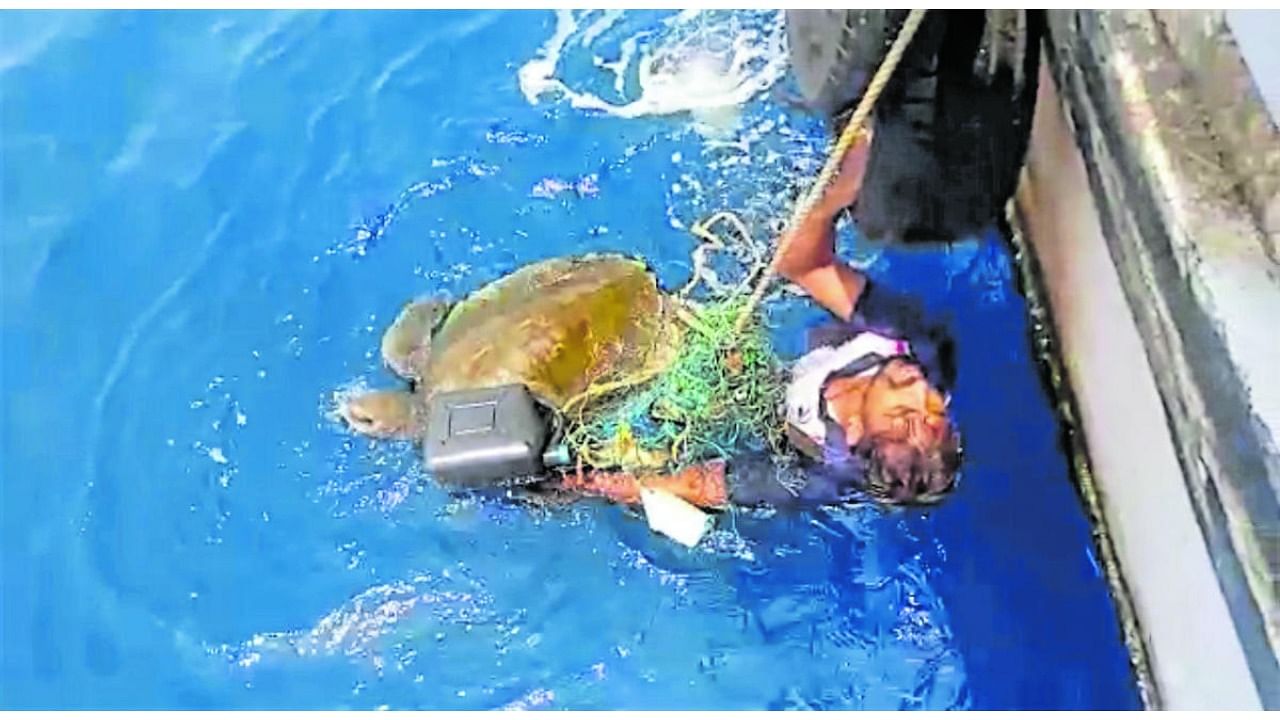
Ravi Ambiga (32) did not hesitate to jump into the Arabian Sea, some 25 nautical miles off Dhareshwar beach in Honnavar taluk of Uttara Kannada district, recently. He was trying to rescue an Olive Ridley sea turtle, whose flippers were entangled in a ghost net and its neck stuck in a plastic can.
“Had I not dived into the sea, the animal I worship would have died of starvation,” he said. Honnavar is among the few Olive Ridley turtle breeding sites in the country. While a large number of turtles arrive at Odisha’s Rushikulya beach, experts have also recorded the nests of these turtles, classified as critically endangered by the IUCN, in Maharashtra and Karnataka.
While the video of Ravi and his team of Aditya Karvi and Ashok rescuing the turtle has been winning the hearts of conversationalists and fishermen, the incident has also brought into focus the menace of discarded plastic nets.
Experts say that ghost nets, a term used to refer to the discarded portion of the gill net that litters the sea, have been resulting in the death of a large number of marine creatures.
Fishermen use the gill net for targeted fishing in the deep sea.
However, due to strong currents or ageing, these nets snap and escape into the sea. Sometimes, fishermen too cut off these tangled nets and discard them in the sea.
Marine researcher Prakash Mesta said: “Ghost nets are one of the main reasons for the death of marine creatures, especially Olive Ridley turtles. Marine animals entangled in ghost nets are unable to hunt and eventually die of starvation.”
Jagannath L Rathod, chairman of the Department of Marine, Karnatak University, Dharwad, said ghost nets kill thousands of sea creatures every year. Most of the time red-listed creatures get entangled in sinkers of the ghost nets on the ocean beds.
He lamented that while Karnataka has regulations and policies for sustainable utilisation and management of marine resources along its 320 km coast, implementation is lax.
Last year, a marine wing was added to the Karnataka Forest Department to protect its sea treasures.
The Fisheries Department, which has been tasked with creating awareness against the misuse of gill nets, it is hampered by staff shortage.
Karwar Fisheries Department deputy director P Nagaraju said, “We have been creating awareness among the fishermen not to leave behind ghost nets or any plastic waste in the sea. But changes are not taking place at the required pace.”
Rathod said fishermen should be given incentives to dispose of used nets with civic bodies to prevent their ending up in the sea. Between January and February this year, carcasses of seven Olive Ridley turtles were washed ashore in Honnavar. Experts say a majority of them died due to accidents, including being caught in ghost nets.